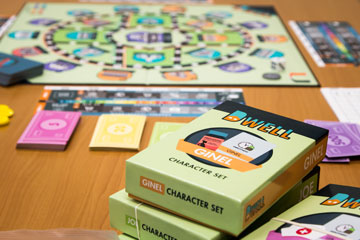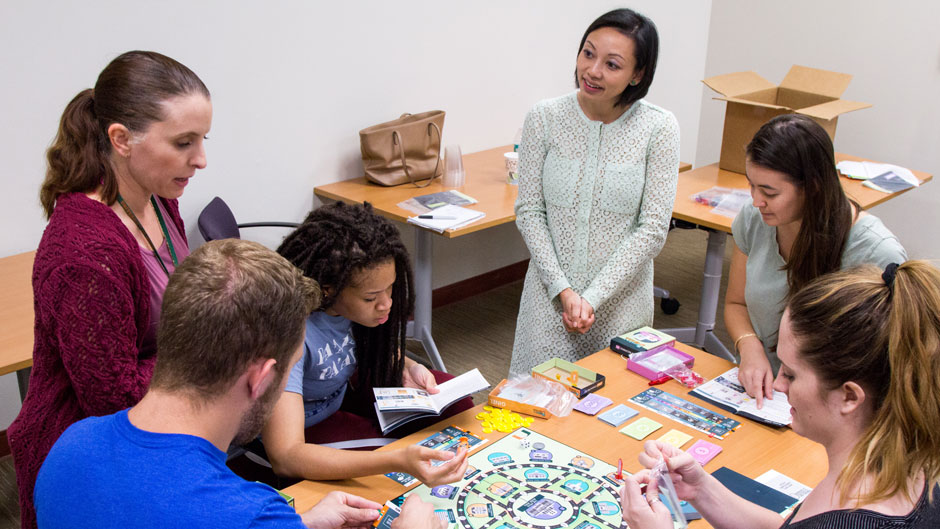Donna has a rough life. She’s working three jobs to keep her family afloat after her husband lost his job. Her family lives in a homeless shelter.
Down the block, teenage Ginel is in dire straits, being both pregnant and jobless and without a steady place to live.
 Both of them are characters in a simulation tabletop game called Dwell that was designed by an interdisciplinary team from the University of Miami School of Communication (SoC) and the School of Nursing and Health Studies (SONHS).
Both of them are characters in a simulation tabletop game called Dwell that was designed by an interdisciplinary team from the University of Miami School of Communication (SoC) and the School of Nursing and Health Studies (SONHS).
Assistant Professor Lien Tran of SoC, who designs interactive social impact experiences including games, in partnership with a team of nurses from the SONHS – Jill Sanko, Deborah Salani, Yui Matsuda, Susana Barroso-Fernandez, Jacqueline Lopez, and Laura Abuja – are the creators of the game. The SoC’s Center for Communication, Culture and Change provided a $5,000 grant toward refining the team’s initial prototype, including its visual design, and printing copies of the game for pilot testing in the classroom.
In the U.S., 40.6 million Americans lived in poverty in 2016, according the U.S. Census Bureau. The goal of the game is for nurses and other health professionals to understand the complexities of poverty and to recognize inherent biases that may prevent them from providing the best health care to these patients, said Sanko, assistant professor at SONHS, who has an extensive background on the use of simulation in teaching.
“Our goal is for nurses to be empathetic and have a deeper understanding of the struggle poor people go through,” Sanko said. “You may have implicit biases that you may not even know. We all judge decisions people make but you may not understand how they came to make them.”
Recently, a group of UM students in an accelerated nursing course played the game, roleplaying as one of five characters with daily as well as longer term goals, negotiating current living conditions and working arrangements in a place called “Dwellville.”
With limited cash and scarce resources, each player tries to navigate the town of “Dwelville” over a four-week span while moving through a board that depicts a neighborhood with a church, clinic, community center, government offices and so on. At the beginning of the game, each player is allotted some cash and a few possessions. A weekly calendar mat lists out a player’s daily tasks.
UM student Gloria Ukaegbu, 26, was cast in the role of Ginel, who was 31 weeks pregnant and living in a park.
“It’s hard,” she said. “I can’t buy chicken or any other food that will spoil. All I can eat is junk food.”
Playing as Ginel, Ukaegbu realized that was not a healthy option for herself or her baby, but she had no alternative.
Tommy Keller, 23, never imagined himself as a veteran hooked on opioids but that was his role during the game. On a Tuesday in Dwellville, he was tasked with picking up his veteran’s check at a government office.
He used his allotted moves to reach the government office but afterwards decided to pass by the bank to deposit the check and found himself without the means to return to his shelter.
“I realize that you have to adapt in this game as in life,” Keller said. “Next time I will make one trip to pick up the check and then wait another day to deposit it. That way I will not get stranded.”
Understanding why people with limited money and resources make certain decisions is crucial to good nursing, said Sanko.
“A patient may tell you I am only taking my blood pressure medication every other day,” she said. “Instead of thinking that the person isn’t being smart, one should explore why they are making this decision.”
Establishing an open dialogue also allows nurses to discuss possible alternatives for poor patients, such as coupons available for medication or opportunities for discounted medicine offered by pharmaceutical firms, said Sanko.
In order to provide more introspection and dialogue, the game offers a “Saturday of Reflection” during which players can talk about what happened during their previous in-game week.
“I worry about my kids and my husband all the time,” said UM student Shayna Chamberlain, who played Donna in the game. Donna was balancing three jobs to support the family while trying to save money to get out of the homeless shelter, but still she had an objective of trying to get help for her husband so he could control his gambling problem.
“I had an overwhelming week but maybe next week will be better,” said Chamberlain. “It’s a lot to juggle.”
As an additional learning tool, the game also provides an online link where the students can learn facts about poverty. Among the facts they learned: 20 percent of U.S. children are poor and living in a family earning less than $23,624 annually for a family of four, according to the Federal Emergency Forum on Child and Family Statistics.
“It’s really exciting to see Dwell in its current form,” said Tran. “As a social impact designer, I typically collaborate with subject matter experts and in this case worked with our team of nursing faculty to understand both curricular needs as well as the topic at hand to design a roleplaying simulation that highlights potential challenges faced by patients living near the poverty line. After many iterations of the game system and lots of testing, I’m excited that we now have a polished version to pilot in the classroom.”

